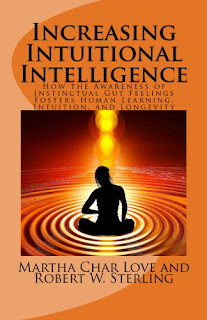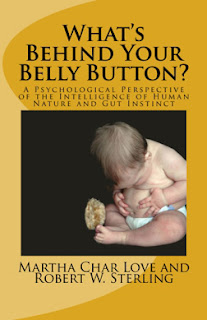This post is for anyone feeling the sadness of a loss of a relationship, but it is also for anyone dealing with the feeling of sadness in general. Sadness and the feeling of loss are connected to depression, so this may also be helpful if you are tending toward depression due to a feeling of aloneness that is accompanied by sadness. There are some techniques for dealing with sadness that successfully dimension it and actually use it as a gateway to self-awareness. We talk about these in this blog post.
We thoroughly look at the anatomy of
emotional feelings in our book What’s Behind Your Belly Button? and give a
new twist to the understanding of these emotions as having a combination of a
feeling component coming from the gut feeling of emptiness (generally not
fullness as needs satisfaction brings intuitive knowing rather than emotion)
and a thinking component coming from the thinking brain. If we experience an
emotion like sadness, we can be sure that our thinking brain (CSN) and our gut
brain (ENS) are at odds with each other and not communicating completely,
although they are certainly trying to do so. We need to separate them further
so we can identify what each is saying to us, and that will allow us to bring
in some fresh information about ourselves that will set the course of a natural
unity of body-mind. In simpler terms, we have to center on how we are feeling
emotionally and allow ourselves to look at both the thinking part of this
emotion and the purely gut feeling part, then trace the source of those in our
understanding of the impact of our experience.
Generally we found in using the Somatic
Reflection Process with people who were experiencing sadness and loss, that the
sadness was related to a past experience in which they assumed some guilt for
the loss, blaming themselves. The sadness that we encountered in the hundreds
of people we counseled was found in somatic reflection to be largely related to
a feeling of guilt. The feeling of guilt is the same feeling of emptiness
whether a person has taken on the thinking judgment that they did or did not do
something particular that caused or contributed to their loss or whether they
took on the judgment that they were too small and inadequate, unprepared,
ill-informed, not-good enough or unaware to act in a manner that would have
avoided the loss.
Often, when we ask people for the first
time if they can see a relationship to their feeling of sadness to the feeling
of guilt, they think we mean something they have done wrong, for which they
will say “no”. But once they examine their feelings, they see their sadness has
a thinking component of how they think they were “not powerful enough or good
enough” and this identity of a “less than” feeling or guilt opens a door of
perception up. It is much easier to deal with one’s guilt from the past and
find the source of the judgments that we have put upon ourselves (generally
back in early childhood where we originally accepted judgments from authorities
or others who did not understand how we felt inside) than it is to deal with a
profound feeling of sadness and loss for which we have no control or think simply
relates to some event in recent times or adulthood. Generally, our adult
romantic losses trigger feelings unresolved from earlier life and are even set
up to happen because we have not cleared our understanding of ourselves in this
earlier event. It does take quite a bit of reflecting on the impact of
life upon you, your gut feelings, to reassess your past and understand that you
are perfectly human, caring in your instincts., and always have been caring.
But until we do find our caring and loving nature inside, we will not feel we
deserve love and happiness, and that is our biggest loss.
We often find that people write us and
say that they have a breakthrough as they read the dialogues and discussions in
Chapter 3 and generally this is a profound feeling experience in which they
find some peace and self-acceptance, and sadness and aloneness begins to shift
toward hope and a feeling of soundness and peace inside. Here is a short
excerpt from Chapter 3 of What’s Behind Your Belly Button? on the "Anatomy
of Feelings". This excerpt introduces the dialogues of authentic sessions
of the Somatic Reflection Process:
“People commonly experience the
awareness of feelings as a combination of logic and feeling rather than a
purely instinctive gut feeling of necessity. The inner instinctive feeling is
surely there but our conscious awareness is so distracted toward the outside
situation through our senses that the instinctive human feelings are available
to us only in a combined form with some outside authoritative thinking we have
accepted. In contrast to the purely instinctive somatic feelings of the human
organism, this type of common feeling experience or level of feeling
consciousness may be called psychosomatic feeling.”
“We experience the
psychosomatic level of feeling to be allied with our attachments to outside
authority. In situations where we are conscious of the importance of what
other’s think or how we perform, we become aware that our basic feelings are
set side-by-side with the logic of the external authority in the situation and
we tend to judge our position in terms of that outside view. Invariably, we
come up short and lose in that comparison. We experience the tendency of the
logic to judge this type of feeling position to be weak and unreliable. The
weakness seems to be related to the logical compromise of our instinctive
feelings. Compromised feelings are inevitably unreliable because in such a
situation we find we are strung-out away from ourselves. From the point of view
of the Self, we find in reflecting on what is important to us that it was the
logic system that we accepted that were unreliable. We find it always
unreliable to accept outside principles that do not satisfy the instinctual
feelings when we apply them to our inner needs.”
“It is helpful to remember
that if the feeling is named—fear, hostility, guilt, jealousy, joy, sadness,
etc.—it is not a basic instinctive feeling since the act of naming by the logic
system attaches the feeling to an outside judgment even though it is related to
emptiness or fullness on the inside of us. And it is the inner instinctive
feelings with which we need to deal not the outside person, situation or thing
with which the named feeling is associated. Often the outside situation is not
even a real factor with which we can deal. We can project on a host of
fantasies in the outside world while the real problem lies deep in our inner
instinctive feelings of necessity.”
Click on a book cover below to go to Amazon to Buy:
If
you are on the homepage of this blog, click word "comment" directly
below to see all comments and make one yourself! If you are on the
webpage for this post, then simply post in the box provided below.



